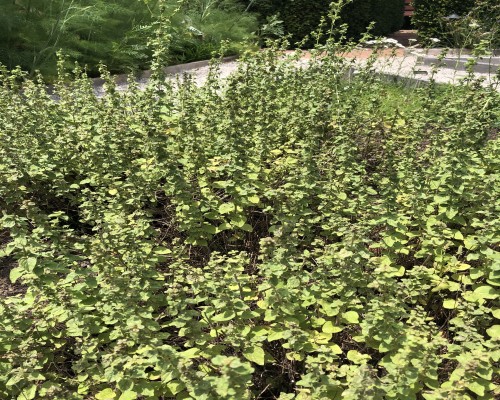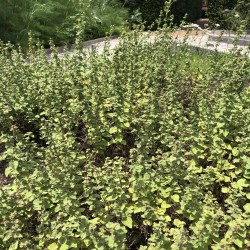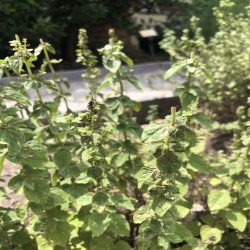WIND MARJORAM.
Called also Origanum, Eastward Marjoram; Wild Marjoram, and Grove Marjoram.
[Descript] Wild or field Marjoram hath a root which creeps much under ground, which continues a long time, sending up sundry brownish, hard, square stalks, with small dark green leaves, very like those of Sweet Marjoram, but harder, and somewhat broader; at the top of the stalks stand tufts of flowers, of a deep purplish red colour. The seed is small and something blacker than that of Sweet Marjoram.
[Place] It grows plentifully in the borders of corn fields, and in some copses.
[Time] It flowers towards the latter end of the Summer.
[Government and virtues] This is also under the dominion of Mercury. It strengthens the stomach and head much, there being scarce a better remedy growing for such as are troubled with a sour humour in the stomach; it restores the appetite being lost; helps the cough, and consumption of the lungs; it cleanses the body of choler, expels poison, and remedies the infirmities of the spleen; helps the bitings of venomous beasts, and helps such as have poisoned themselves by eating Hemlock, Henbane, or Opium. It provokes urine and the terms in women, helps the dropsy, and the scurvy, scabs, itch, and yellow jaundice. The juice being dropped into the ears, helps deafness, pain and noise in the ears. And thus much for this herb, between which and adders, there is a deadly antipathy.
————————————————————————————————————————————————————————
SWEET MARJORAM.
Sweet Marjoram is so well known, being an inhabitant in every garden, that it is needless to write any description thereof, neither of the Winter Sweet Marjoram, or Pot Marjoram.
[Place] They grow commonly in gardens; some sorts grow wild in the borders of corn fields and pastures, in sundry places of this land; but it is not my purpose to insist upon them. The garden kinds being most used and useful.
[Time] They flower in the end of Summer.
[Government and virtues] It is an herb of Mercury, and under Aries, and therefore is an excellent remedy for the brain and other parts of the body and mind, under the dominion of the same planet. Our common Sweet Marjoram is warming and comfortable in cold diseases of the head, stomach, sinews, and other parts, taken inwardly, or outwardly applied. The decoction thereof being drank, helps all diseases of the chest which hinder the freeness of breathing, and is also profitable for the obstructions of the liver and spleen. It helps the cold griefs of the womb, and the windiness thereof, and the loss of speech, by resolution of the tongue. The decoction thereof made with some Pellitory of Spain, and long Pepper, or with a little Acorns or Origanum, being drank, is good for those that cannot make water, and against pains and torments in the belly; it provokes women’s courses, if it be used as a pessary. Being made into powder, and mixed with honey, it takes away the black marks of blows, and bruises, being thereunto applied; it is good for the inflammations and watering of the eyes, being mixed with fine flour, and laid unto them. The juice dropped into the ears eases the pains and singing noise in them. It is profitably put into those ointments and salves that are warm, and comfort the outward parts, as the joints and sinews; for swellings also, and places out of joint. The powder thereof snuffed up into the nose provokes sneezing, and thereby purges the brain; and chewed in the mouth, draws forth much phlegm. The oil made thereof, is very warm and comfortable to the joints that are stiff, and the sinews that are hard, to molify and supple them. Marjoram is much used in all odoriferous water, powders, &c. that are for ornament or delight.
Source: Project Gutenberg EBook version of Culpeper’s The Complete Herbal (1653), [113]


